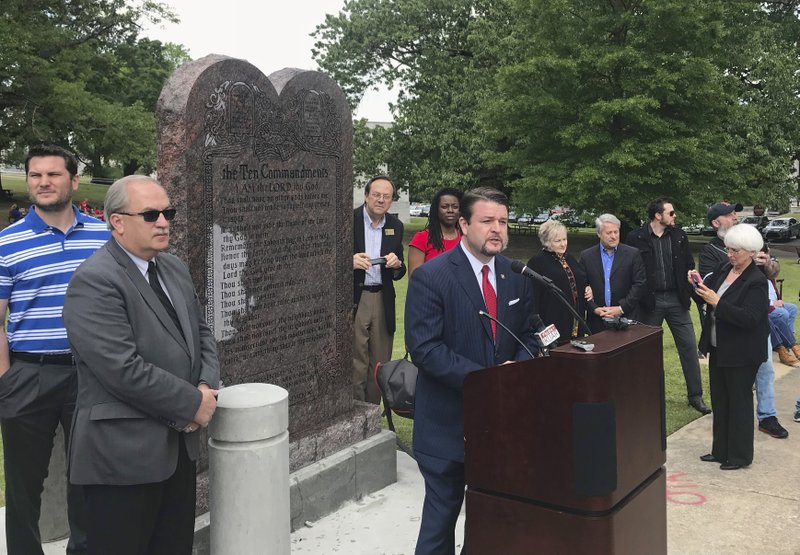Sen. Jason Rapert cannot avoid giving a videotaped deposition this morning in a federal lawsuit over the Ten Commandments monument he shepherded into existence on the state Capitol grounds, but the recording cannot be publicly distributed, a judge said Wednesday.
Rapert, R-Conway, isn't a defendant in the 2018 lawsuit challenging the constitutionality of the 6-foot-tall monolith, but he didn't initially object to being subpoenaed last month by the original plaintiffs to be deposed at 9:30 a.m. today.
In a motion filed Wednesday, however, he asked the judge to quash subsequent subpoenas from a second group of plaintiffs and from an intervenor for a videotaped version of the deposition. He also asked her to issue a protective order limiting the possession and use of any such recording, saying attorneys for the other parties, including the Satanic Temple, wouldn't agree to limit the recording's dissemination.
A previously recorded interview with Rapert by the producers of the film Hail Satan, which stars the temple's founder, was "featured prominently in the film," attorney Paul Byrd wrote in the motion. He argued, "Based upon this and other experiences with [the intervening plaintiffs] in this matter, Sen. Rapert is absolutely convinced that, absent the protective order he now seeks, the videotaped recording of his deposition will be used by [them] to cause him extreme embarrassment and harassment."
Without a protective order, Byrd wrote, "there will be nothing preventing them from using it for their purposes, including disseminating it widely on the Internet, thereby creating countless opportunities for embarrassing Sen. Rapert by cutting and splicing the videotape in as many ways as can be imagined." He called the possibility "a near certainty."
In response to his motion, the second set of plaintiffs -- who initially filed a separate lawsuit challenging the monument -- said they wanted to make a video recording of the deposition "so that out-of-state counsel can see the deposition to prepare for further proceedings."
They objected to any limitations Rapert wanted to impose on the use of the video, saying that would mean that attorneys "cannot even show the videotape to our clients."
They also noted that Rapert "regularly and voluntarily appears in the media and on social media. He is clearly a public figure." And, they said, "the lawsuit involves a matter of public interest."
Attorneys for the Satanic Temple, which describes itself as an organized religion with a mission to "encourage benevolence and empathy among all people," also objected, noting that Rapert is the director of the American History and Heritage Foundation, which donated the monument, and that as a key witness in the case, "his deposition testimony is subject to the closest scrutiny."
Those attorneys also noted that Rapert is a public official who has announced his intention to run for lieutenant governor, as well as a founding member of the National Association of Christian Lawmakers, whose stated purpose is to establish a "more godly nation."
They argued, "as a public figure who generally and repeatedly interjects himself into the issue of separation of church and state, and specifically interjects himself to this case, Sen. Rapert has no expectation of privacy with respect to his deposition footage."
Also weighing in Wednesday was the attorney general's office, which is representing the sole named defendant -- Arkansas Secretary of State John Thurston. The attorneys for the state supported Rapert's request, arguing that the Satantic Temple has "a history of engaging in criminal and harassing behavior directed at third parties and Rapert in particular," which they said makes Rapert's request "well-founded."
In an order also issued Wednesday, U.S. District Judge Kristine Baker -- who is scheduled to preside over a trial on the merits of the case during the first week of December -- said the deposition will proceed, and will be videotaped. However, she said, the original recording must be immediately turned over to the first group of plaintiffs who sought the deposition, who "shall be responsible for maintaining the confidentiality of the video recording."
Baker said no copies may be made of the recording, except as she permits after reasonable notice to all parties. She emphasized that no copies may be made or distributed even to "any other counsel, parties, or third parties in this litigation," unless she grants such an order.
She described her order as temporary.
The lawsuit was first filed by four members of a walking and cycling group who complained that the monument's prominent presence on their regular route offended them. The group was backed by the American Civil Liberties Union of Arkansas. A second lawsuit was filed by a coalition of people representing various religions and secular groups. Because both groups argued that the monument violates the First Amendment's Establishment Clause by constituting a state-sanctioned endorsement of one religion, they were merged into one case.
The Satanic Temple was later allowed to intervene, over the objections of the first two groups of plaintiffs.
A Ten Commandments monument was first installed on the Capitol grounds on June 27, 2017, but was knocked down and shattered into pieces that night by a man who rammed it with his vehicle. A replacement monument, this time surrounded by 3-foot-tall concrete posts, was installed April 26, 2018, in the same location.
Metro on 09/12/2019
